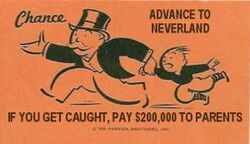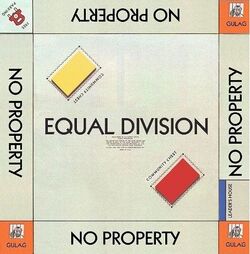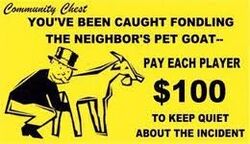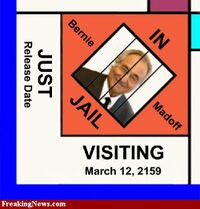Monopoly (game)
Monopoly is a property trading game first published in the United States as “Competitive Free Market” in 1934. Players moved around the board on the roll of a pair of dice, vying with competitors to collect properties, upgrade accommodation and drive down rents. Extra points were available as the quality of life of one’s tenants steadily improved, allowing them to work harder, improve their lives, make career progress and move into swankier accommodation while at the same time paying higher taxes which could be used to cross-subsidise other civic assets such as hospitals, schools and colleges. This idea proved wildly unpopular in a country founded on the principle of tax evasion (see: American Revolution) and the original manufacturers were quickly bought out by Parker Brothers, a subsidiary of Microsoft, which immediately changed the rules to mirror their own successful business model.
The newly remodeled game called for players to cheaply acquire the property of others, scarcely develop it, increase the price and constantly reissue it until they controlled the entire board. The revised rules allowed for competitors to be ruthlessly squeezed out of the market until it became impossible for anyone to operate normally without the use of Microsoft products. Corporation tax remained payable but only on the birthday of another competitor and at a maximum of $15 irrespective of the number of billions of dollars of profit earned. They called the revised game Windows, reissuing it as XP, Vista and finally Windows Monopoly when Satan retrospectively patented the six-sided die, rendering all other board games illegal. The final act of the game was to cede control of one’s property portfolio to a trust operating solely for one’s own benefit and to salve one’s conscience by giving a few Dollars to photogenic Aids orphans in far-away and amusingly named countries.
The Evolution of the Board
Irrespective of the country of issue, the Monopoly game board has forty spaces containing three Chance spaces, three Community Chest spaces, two taxation spaces and four free corners. There are twenty-eight properties; four of which are Railroad stations, two Utilities and the remainder coloured streets. In the original American version, most of the properties were coloured red and included such properties as Cherokee Plains, Navajo Heights and Indian Falls, but within days of the first version's issue, these had been replaced by thirty two white properties (Aryan Street and Klan Avenue among them) marked out by housing and hotels in high grade green and red plastic respectively. On the eight brown properties (Cotton-Pickin’ Road, Chain-Gang Heights, Lynch-Mob Canyon etc), no hotels were allowed and all housing consisted of tar-paper shacks which could be upgraded with corrugated iron roofs or adorned with burning crosses.
Since the 1960s, following complaints from the NAACP, Microsoft allowed the game to evolve more regularly to reflect America’s changing demographics. Though there are still few truly multi-coloured squares there are now fewer entirely white-only properties though careful reading of the rules shows that a minimum of 85% of all property must remain white-owned throughout. Only two brown-only properties remain (Harlem and Compton), the remaining properties are now populated with yellow properties like Chinatown (San Francisco), Little Vietnam (Pittsburgh) and French Fighting Spirit (whereabouts unknown), green properties (Tree-Hugging Street, Vegan Street, Car-free family Drive) were introduced in the late 1970’s and in the late 1990’s a vast swathe of red properties appeared officially owned by the bank but in fact underwritten by trillions of dollars of loans from the government of Communist China.
Other changes made at the same time have seen Get out of Jail free cards issued automatically to the richest players, Income Tax and Luxury Tax payable only by those without the means to purchase one of the Accountancy squares, and Free Parking abolished as UnAmerican.
Chance and Community Chest

There are sixteen Chance and Community Chest cards, although owners of White properties who can raise the $650,000 required to purchase three years’ residence at one of the Ivy League properties are given considerably more Chance than other competitors. Chance cards now read;
- Your Hedge Fund is bankrupt – the taxpayer bails you out. Collect $500 million.
- Your Christmas Fund Matures – you do not have to spend the holidays at the homeless shelter this year.
- Advance to the nearest Utility – sell it to overseas investors. Collect $2 billion.
- Advance to the nearest Railroad – you attempt to jump a freight-wagon, roll higher than a 2 to avoid being crushed beneath its wheels.
- Pay poor tax of $15. Give $650 to the Republican Party to ensure Socialist evil like this never happens again.
- You have been elected chairman of the board. Pay each player $50 and collect an annual salary of $300,000.
- You are stopped while Driving Under the Influence. Go to Jail and pay a fine of $200 or perform oral sex on the cop.
- You have won a crossword competition. You receive a commemorative pen and the scorn of your neighbours.
Similar Chance cards appear in International editions of the game with only minor local variations such as the British “You have become embroiled in a riot at a football stadium. Go straight to hospital” and the French “Your property has been invaded by a neighbour. Bury your cheese in the cellar and prepare to casually smoke Gitanes for some years until the other players evict him.”
Community Chest cards now include:
- Grand Opera Night – pay the bank $500 a ticket for each remaining competitor. Write this off as a tax loss.
- Pay school tax of $150. Pay school fees of $15,000 so your children aren’t forced to live with the common herd.
- You are assessed for street repairs – $40 per house, $115 per hotel. Fortunately, no one who lives in your property can afford legal representation to have the assessment enforced.
- You have come second in a beauty competition. Pay the Mafia $50,000 to throw acid in the face of your opponent.
Again, there are regional variations for the remaining cards with the Australian “A grumpy crocodile moves into your pool. Prod it with a stick, pay a fine of A$500 or take a swim with the sting-rays” proving more popular than the German “Your Greek friend appears to be bankrupt. Lend him several billion Euros – like you’ll be seeing those again.”
Rules
Cash is distributed to players at the beginning, with the white players splitting 70%, Hispanic, black and other minority players splitting the remaining 30% and Native Americans being given small parcels of empty space in the centre of the board and a bottle of Jack Daniels. Players proceed clockwise by turn, moving the number of spaces indicated on their dice and receiving another turn if they throw a double six or their father is especially well-connected. Three double throws in a row, however, will result in a player being sent to Jail or elected to the presidency.
At the start of the game, a player is likely to land on an “Empty” square, or Terra Nullis. He will then plant his flag in this square and proclaim ownership based on discovery, rejecting the claims of the previous resident who had merely stumbled on the square by chance several thousand years earlier. Should the previous occupant wish to remain, the land may be purchased by gifts of smallpox-infused blankets or small lead sculptures explosively projected into the back of their heads.
If the player rejects the opportunity to develop the land, he may choose to allow bison to graze it for some time before later attempting to plough it during a prolonged dry spell so that the square will blow away in the wind, stopping other players from taking ownership. If the square is already owned by a non-Native American (or “Real” human) he will be required to pay rent determined by how well-developed the square has become. Several players may “rent” a property in any turn, with the Brown and Yellow properties licensed to be occupied by up to 30 residents for each house. Hotels illegally constructed in such locations may rent accommodation by the hour.
Landing on Chance or Community Chest may result in a fine (payable immediately) or an award (payable only after expensively pursuing the government through the courts). Landing on the “GO TO JAIL” square means that a player does not get to collect the $200 dollars usually due for passing the square labelled “GO” in the US (but “WELFARE” in the rest of the world). As disadvantageous as this can be at the start of the game, it can often be a positive advantage to be jailed later on as one spends several turns without rent, food or transport expenses and the stay involves the promise of exotic, new experiences at the hands of fellow residents with names such as “Bubba” and “Daddy Dong”.
If a player is in Jail, he misses three turns unless he throws a double, agrees to become the governor’s bitch or has the ability to do the warders’ tax returns. At the end of the three turns, he must pay a $50 release fee unless he has expended the energy to slowly excavate a hole in his cell wall, conceal it behind a poster of a 1940’s Hollywood starlet and is prepared to crawl several metres through a shit-filled main sewer. While a player is in Jail, he is still permitted to trade property, collect rents and otherwise run a profitable business (see Bernie Madoff and Conrad Black).
Properties are developed by purchasing houses from the bank, generally on 20 or 25 year mortgages backed by a small deposit and proof of regular income. According to recent rule changes, it is no longer permissible to purchase a “Sub-prime” mortgage, generally considered to be mortgages on the brown properties to players whose only source of income is their $200 “GO” payments.
Houses may not be built on the railroads (except in the Indian version), or within the utilities (except in the countries of the former USSR). Second houses may not be built on the site of a first unless all properties of that colour are similarly developed or (in China) unless one has been a card-carrying member of the Communist Party for at least 10 years and has a sack of Renmimbi that one no longer has any use for and is prepared to “lend” to the local commissar.
If a player goes bankrupt, he is eliminated from the game (unless he is currently the Banker, in which case Central Government will cover his debts). His remaining assets are forfeited to his creditors in the following order: IRS, Bank, WalMart, Chucky Cheese
Tokens
The tokens used by players of Monopoly vary from country to country as much as the various Chance and Community Chest cards. The Car and the Dog appear in most versions, although as an unclean animal the dog is generally replaced by a comely goat in Islamic countries. The battleship still appears in many countries and, since 1945, has reappeared in the German edition having been replaced in 1936 by the U-boat. Since the 1980s, the Iron has largely disappeared from American sets and was replaced by the Mexican Maid, and in England the Top Hat has gone, with the Hoodie taking its place.
Minor regional rule variations allow for interactions between characters that are geographically unique. In Australia, the Dingo token is still allowed to eat the Baby. In South American sets, the General may make awkward opponents permanently vanish, while in the Israeli version, the Tank is allowed to occupy neighbouring properties and build walls around them, refusing to allow competitors access to any funds from passing GO.
Other characters standard to all nations include The Kumquat, The Nipple-Clamp, The Parking-Meter, The Death of Saint Sebastian, The Hedgehog, The Teas-maid, Sesame Street, The Protestant Reformation, The Higgs Boson, The Post-Coital Cigarette and Shame.
Uncle Pennybags
By 1946, Parker Games realised it required a “face” for Monopoly to disguise the single-minded ruthlessness of the game-play. Following Microsoft company policy, it was decided that rather than investing in the development of a new character, it would be more cost effective to simply steal one. Consequently, undercover operatives from Seattle kidnapped Colonel Sanders on his return from active service in Germany.
Transported to a secret Microsoft base in the Caribbean, Sanders underwent a series of innovative interrogation techniques until he agreed to shave his goatee and adopt a Top Hat for a sequence of publicity stills. There is some suggestion that a number of other, more compromising photographs were taken in the company of an under-age Gibbon. Certainly, Sanders continued to be the secret face of Monopoly for several decades until he was assassinated by an irate Uncle Ben during the Black Panther movement in the 1960's.
In recent years, new generations of Uncle Pennybags have been tried in which the stately old gentleman has been variously an illegal immigrant, manual worker, a disabled lesbian, a new age frog-fetishist, and Daniel Craig. The current incumbent has returned to playing the role as a grey-haired Georgian Billionaire though in 2009 The Weekly World News reported that he had been born as Ellie-May Scruggs, and had served a three year sentence between 1999 and 2002 for persistent solicitation.
See Also
| Featured version: 2 January 2013 | |
| This article has been featured on the main page. — You can vote for or nominate your favourite articles at Uncyclopedia:VFH. | |
This article was one of the Top 10 Articles of 2013.
|








